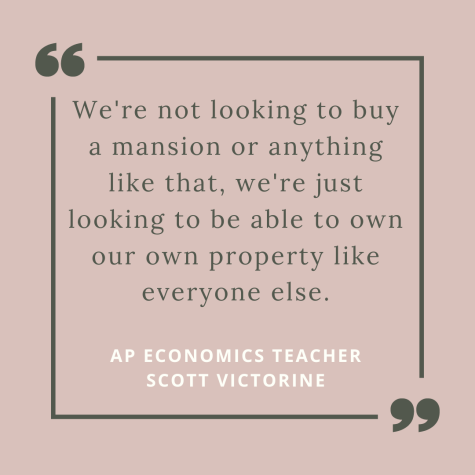Closer to home
Looking into the development of new low-cost teacher housing in Cupertino
Nhat V. Meyer | Bay Area News Group
Santa Clara County Supervisors plan to build affordable housing on this site near North Wolfe Road.
May 31, 2023
An ongoing project for affordable teacher housing is currently underway at 10333 North Wolfe Road, Cupertino and is intended to help decrease the commute time for local teachers traveling to work. Santa Clara County Supervisors Joe Simitian and Otto Lee proposed the housing development plan last year and the acquisition of land for the plan was approved by the Santa Clara County Board of Supervisors on March 14.
According to Supervisor Simitian, the plan is still in its early stages. Simitian states that the plan requires three parts: “a piece of dirt, funding and community support.” He hopes to select a nonprofit development partner to work with the county later in the year and analyze the site, which will allow the county to understand the amount of housing that can be built and the funding required.
AP Economics teacher Scott Victorine is supportive of the plan, explaining that teachers in the Bay Area are often unable to compete with others who work in the tech industries when it comes to buying homes. Victorine notes that although teacher incomes in Cupertino are high compared to other parts of the country, the cost of living offsets that.
“Teachers don’t always make the same wages as some of the other people they’d be competing with to purchase housing or to acquire housing,” Victorine said. “We don’t have stock options or anything like that as well. Although we do make pretty good money as teachers, it’s just that it’s the nature of the beast in the area we live in, where there’s other industries that do particularly well and subsequently we pay more to live here.”
Senior Abhik Das has seen the results of this housing issue with some of his teachers. He references his middle school yearbook teacher, who had to deal with commuting a long distance to school every day.
“She had to make a really big effort to include in her plans the fact that she had to travel about an hour to get to school and then go back home,” Das said. “Even if we had yearbook deadlines, she would still have to worry about: ‘How do I get home on time so that I have this work life balance?’ I think one of the biggest struggles is that Cupertino teachers are struggling to get that balance simply because of this housing issue.”
Victorine is also acquainted with colleagues who live far from where their school is located. He said there are teachers who live in Morgan Hill, which is about a half hour drive away from Cupertino without traffic, as well as a previous member of the custodial staff who lives in Manteca, a city more than an hour drive away. Victorine states that these long travel times can cause difficulty for teachers to complete work. Simitian agrees and hopes that the project will be able to solve some of these issues.
“Time in the car is time that can’t be spent helping a struggling student, or preparing lesson plans or attending any number of events that make up the fabric of our schools,” Simitian said. “By having teachers and school staff work and live nearby, I hope this project helps strengthen their role in the community, and makes it easier to retain the topflight talent that has made our schools some of the very best in the nation.”

Simitian mentions that one particular issue the Supervisors hope to target is the “missing middle” — people who have enough income to not qualify for traditional affordable housing but still have the same issues with overly expensive housing in the Bay Area. Victorine is one of those who falls under the category that Simitian describes.
“My wife and I, with our joint income, we don’t qualify for a lot of programs that would benefit us, yet we’re still in the same boat,” Victorine said. “It often feels like we’re right stuck in the middle and that even though our incomes look great, we’re not actually able to buy [homes] right now. Yet we don’t qualify for any type of assistance either. It’s challenging because we do have a daughter and we’re not looking to buy a mansion or anything like that, we’re just looking to be able to own our own property like everyone else.”
Das says the housing plan is an important step in the right direction but mentions that COVID-19 has caused construction prices and labor to be extremely high. As a result, to avoid raising housing prices to pay for the project, the project may end up taking a large amount of time and government funding.
“If you don’t have the budget to create the project in a certain timeline, the easiest way to do that is to wait until you get more money and the easiest way to get money is by applying for government grants, but that still takes time,” Das said. “So the easiest way to pay off rising prices and construction would be to wait it out to increase the time it takes to open up this facility.”
On the contrary, Victorine sees the project in a more positive light. He explains that the plan “is really only a positive” since it can help teachers and other staff move closer to the schools.
“[The project gets] people more invested in the community that they work in, [since] not only do they work in [the] community, now they live here,” Victorine said. “I’m really glad that the city is taking a look at this seriously and that they’re actually considering it. It’s an issue that if we leave it to the federal or state governments, it doesn’t always get done. I’m glad that it’s taking place at a local level, and I’m really hopeful that it works out.”




























